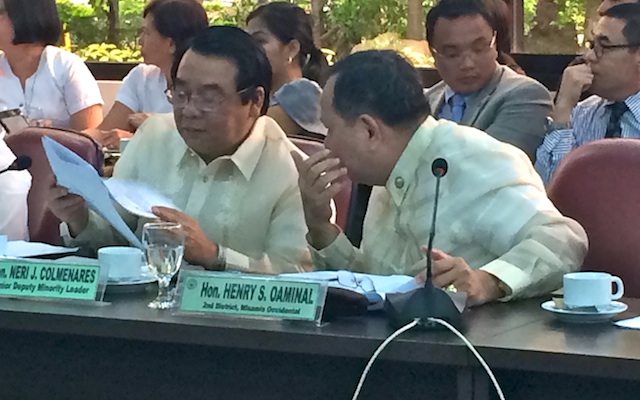SUMMARY
This is AI generated summarization, which may have errors. For context, always refer to the full article.


MANILA, Philippines (UPDATED) – The House of Representatives on Wednesday, December 10, passed on 3rd and final reading the joint resolution granting special powers to President Benigno Aquino III that are meant to address the projected shortfall in energy reserves in Luzon in summer 2015.
Aquino certified the measure as urgent on December 2, allowing two successive plenary votes to be conducted on December 10. The 2nd reading vote was done via ayes and nayes, while lawmakers voted 149-18 on 3rd reading to approve the joint resolution.
The measure met strong opposition from the minority. In a press conference Wednesday afternoon, Bayan Muna Representative Neri Colmenares maintained there was no need for the so-called emergency powers. He cited the admission by the Department of Energy (DOE) that the additional energy to be generated would only cover shortages in reserves, and not in the power supply per se.
Colmenares said the joint resolution would only fast-track the establishment of power plants.
House Joint Resolution No. 21 authorizes the President to generate additional energy capacity through the following:
- Interruptible Load Program – a private sector-led scheme that requires businesses with self-generating capacities to turn on their back-up generators and disconnect from the grid during peak periods
- Fast-tracking of new committed projects, and plants for interconnection and rehabilitation
It also allows national agencies and local government units to suspend the operability of environmental laws, such as the Biofuels Act, Clean Air Act, the Philippine Grid Code, and the Philippine Distribution Code – measures which are meant to mitigate measure adopted for the Wholesale Electricity Spot Market.
The original intent of the joint resolution was to give the executive – upon the request of the DOE – the power to purchase or rent generating sets that would have cost between P6 billion to P12 billion to prevent massive brownouts.
Earlier projections from the DOE estimated 3-5-hour rotating brownouts for 5 days in a row.
But subsequent data from the DOE itself showed that the supposed energy crisis was not as bad as projected and the additional capacity needed is only to ensure the amount of reserves and not to fill up a shortage on supply.
The joint resolution is designed to keep energy reserve levels at 782 megawatts to cover for heavier energy usage during the summer months of 2015. Of the figure, 135 megawatts worth of dispatchable reserve power is needed while 647 megawatts will be reserved for contingencies.
After DOE data failed to justify the need to purchase or lease gensets, the House watered down the proposal to focus more on the ILP.
Suspension of environmental laws
But the final version of the joint resolution approved in the House went beyond just the ILP, Colmenares said.
The Senior Deputy Minority Leader warned that the provision authorizing the suspension of environmental laws would only facilitate the establishment of power plants.

“Our analysis during the interpellation with [Batanes Representativ]) Dina Abad is right. The crux of the matter is not really anything else except they want to suspend environmental laws to fast-track the application of power plants since they don’t need to fulfill requirements under the law,” Colmenares said in a mix of English and Filipino.
“This is a joint resolution not to cure any shortage of supply. This is a joint resolution to facilitate the establishment of power plants even if they violate our environmental laws and other rules requiring consent, consultation. This is now clear, especially since they admitted last night that there is no supply shortage. It’s a question of reserves,” he added.
The measure remains stalled at the Senate despite an urgent certification from the President.
Senator Sergio Osmeña III has been wary of granting additional powers to the President. He said the ILP would be enough to cover for the shortfall on reserves.
Oriental Mindoro 2nd district Representative Reynaldo Umali, chairman of the House committee on energy, said he is planning to have another meeting with Osmeña within the week.
“I think we are on the same page. I have had about 5 meetings already with Senator Serge. I gave him a copy of our draft. It was then a draft that I showed him. He said the joint resolution seems all right. There are just some items that he wants to be clarified on,” Umali said.
Osmeña wants to incorporate provisions imposing a secondary price cap, which installs guarantees that electricity prices won’t shoot up, Umali said.
Some critics have opposed the granting of emergency powers based on arguments that additional power costs could be passed on to consumers.
Under House Joint Resolution No. 21, Aquino’s special powers, which will be implemented through the DOE, will be effective until July 2015 unless withdrawn by the President at a sooner time.
Other salient provisions
Under the measure, the government will reimburse all public and private entities with self-generating facilities who will participate in the ILP for their fuel expenses and “reasonable recovery for their use.” The reimbursements will not be subject to value-added tax.
Entities who choose not to participate may be manually de-loaded from the grid without compensation.
All government offices are encouraged to retrofit their offices and buildings with energy-efficient, such as LED bulbs, air conditioning units with inverters, and solar energy systems.
The joint resolution shall take effect immediately upon publication in 2 newspapers, with implementing rules and regulations required to be distributed within 30 days.
The President is required to submit a monthly report to Congress on the effectiveness of the scheme.
– Rappler.com
Add a comment
How does this make you feel?
There are no comments yet. Add your comment to start the conversation.